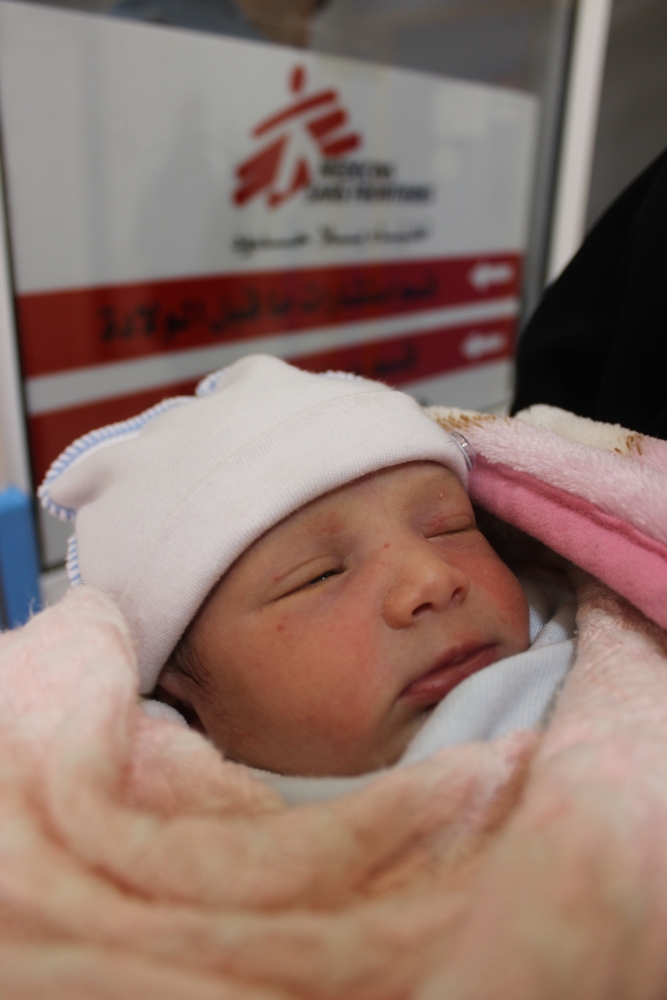Nurse Nicole Campbell recently returned from her second assignment with Doctors Without Borders/Médecins Sans Frontières (MSF) in Jordan. Here, she discusses her experiences in the MSF maternity hospital in Irbid.
The Irbid project in Jordan was set up to respond to the Syrian refugee crisis by providing free maternal and newborn health care for both the refugees and vulnerable Jordanians. MSF also runs a mental health program for children showing signs of distress from war and displacement. The objective of the project is to cover the health needs of refugees in host communities in Jordan who have no access to such care elsewhere. Jordan is now home to more than one million refugees fleeing Syria.
The neonatal unit has recently expanded to care for 16 newborns. We have the capacity to foster the development of premature babies as well as treat those babies that are sick due to sepsis (severe infection) or jaundice, for example.
What does an ordinary day involve?
My daily activities in the neonatal unit involve attending morning handover, assessing the babies, and any new admissions with the nursing staff, facilitating ward rounds with the medical and nursing teams, and giving in-service training on a topic of the week. We are also currently trying to expand our catchment area in Irbid so we are getting ourselves out there; making sure people know who MSF is and how we can help them.
Tackling Challenging Cases
When I first arrived in Jordan there was a baby diagnosed with neonatal diabetes mellitus, a rare form of diabetes different to types one and two, which occur later. The neonatal condition can be chronic and lifelong. This baby was on continuous intravenous fluids, a grueling insulin regime, and countless procedures to maintain and monitor his blood glucose levels. He and his mother will always be memorable, as it’s the first newborn I have ever seen with diabetes mellitus.
They stayed with us for a very long time and eventually we were able to discharge them. When the mother came back into the hospital the baby was now three months old. She had a log book with all his blood glucose readings and was able to tell us her management for every event.
It was impressive how well this little family was adapting to the needs of the baby and how happy they were, especially because this mother had previously lost two babies, both within the first three to five days of life. By providing advanced neonatal care to this newborn we saved his life and helped this mother complete her family.

What are the greatest rewards and challenges?
The greatest reward was sending babies home to their families at the end of the day—seeing mothers who have been so frightened and so unsure bonding with the nursing staff, sharing in our successes, supporting each other and smiling when the day comes that they can go home.
The greatest challenge for me was being aware that there are thousands of Syrians in refugee camps and knowing that these women are having babies and need health care. Getting access to these women and offering them a safe, free place to have their baby is not as easy as it would seem.
Professionally, I have developed in ways I never imagined. I have gained management skills, leadership skills, and a level of adaptability I didn’t know was possible. I have no problem going to meetings with other nongovernmental organizations and communicating the needs of MSF. I’ve also been able to become a strong advocate for the rights of our patients and a voice for the nurses. I really enjoyed helping to empower the nurses to be informed, to challenge, and to educate each other.
What advice would you give other neonatal nurses considering working with MSF?
If you really want to do it, and you want to do it for the right reasons, then it will be the best decision you will make. It will change who you are and the way you see the world. If you can give one baby or one child back to their family in an environment where they have nowhere else to turn, then it’s a feeling that will stay with you forever.
"The greatest reward was sending babies home to their families at the end of the day—seeing mothers who have been so frightened and so unsure bonding with the nursing staff, sharing in our successes, supporting each other and smiling when the day comes that they can go home."
Nicole Campbell





